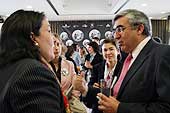 |
| Social success: Meeting people over drinks may land you that plum job |
For most people job hunting means the tedium of producing an up-to-date CV and mailing it to prospective employers. It can become a bit obsessive and some people are known to send out multiple job applications that stand little chance of being read. One of the most common complaints in readers’ letters is that they do not even get an acknowledgement.
It is probably far more realistic to accept that you are not going to get a reply. Age-discrimination legislation is going to make employers much more cautious about acknowledging random applications. And, to be frank, cold-calling the job market is not going to get you very far.
The answer is probably to adopt an unconventional approach. Dump your CV in the waste bin and try something different. Martin McDonnell, for example, is that rarity, a specialist in networking. He has studied how well it works and the figures he has come up with suggest it is worth a try.
Research by the Chartered Institute of Accountants showed networking was very effective. Of those surveyed under the age of 35, a quarter got a job through networking; between the ages of 35 and 50, it was half; and over 50, it was above 80 per cent.
One of the strengths of networking is that it allows the jobseeker to take a positive role, unlike someone replying to an advertisement, who is passively waiting for a reply.
DBM, the consultancy that McDonnell works with, specialises in clients “in transition”, using networking to help them put their best foot forward. “It’s critical to finding a job of your choosing,” he said. When McDonnell left British Telecom, he found his consultancy job through networking. He cannot positively recall using any other route and now believes that he was slowly drawn to networking.
He had decided to specialise in it when he was asked by DBM if he could give a seminar on the subject. “The rest was history,” he said. He now gives weekly seminars on networking and also holds one-to-one classes.
“Of the routes to a job, there’s answering advertisements, sending out your CV and researching the market. Unlike with networking, with these other methods you are just waiting to be called,” he said.
Research showed him that 55 per cent of people found their jobs through networking. Many of them came through what he calls a “weak tie”, which means the job offer did not come through someone who was the first point of contact but someone further away. What his research also showed was that, as your career progressed, networking became an even more powerful tool.
Most of us are slow to consider networking if we lose our jobs. Psychologically vulnerable, we usually take the tried-and-trusted route, relying on agencies and ads — the techniques that have been successful in the past at a more youthful age.
Most people are reluctant to explore their networks first. We are often deterred by the ambiguity of networking, which means it may take some months to come up with a job. Similarly, networking is full of rejection, and many people may not like to face this reality head on. Consequently, people decide to send off their CVs and fall back on the agencies and ads. But networking can at the least be a way of getting in touch with better agencies.
A friend may be able to break the ice with a recommendation for you: “So-and-so is very bright, or has some good projects in his record”. This is better than cold-calling and offers the chance of securing a meeting and progressing beyond just getting your name on a website.
Good advice on how to go about this comes in a book written by an American academic, Professor Mark Granovetter, called Getting a Job: A Study of Contacts and Careers. This is a classic that among other things warns never to underestimate the strength of weak ties. In his survey, 56 per cent of the people got their jobs through networking and 83 per cent of these people got their jobs through a weak tie, in other words, someone who had been in touch with someone else.
McDonnell lists five crucial qualities for successful networkers:
![]() Strong self-belief with clear life and career goals and a set of priorities.
Strong self-belief with clear life and career goals and a set of priorities.
![]() Genuine concern for other people and interest in them as opposed to being interested in things. Good listeners who can engage with people.
Genuine concern for other people and interest in them as opposed to being interested in things. Good listeners who can engage with people.
![]() Unashamed humility. These people are never afraid to ask for help.
Unashamed humility. These people are never afraid to ask for help.
![]() Persuasive energy. They are able to persuade people to see them in a very positive way.
Persuasive energy. They are able to persuade people to see them in a very positive way.
![]() Colourful courage. Having the courage to try networking or take a risk.
Colourful courage. Having the courage to try networking or take a risk.
Jobseekers exploring these qualities are asked to share them with the other people in McDonnell’s class, which means them moving outside their “comfort zone”. The aim of this is to build up the jobseeker’s confidence, which has usually taken a knock during the search.
But don’t let lack of confidence lead you to fall back on grasping at straws or that tired old CV.










